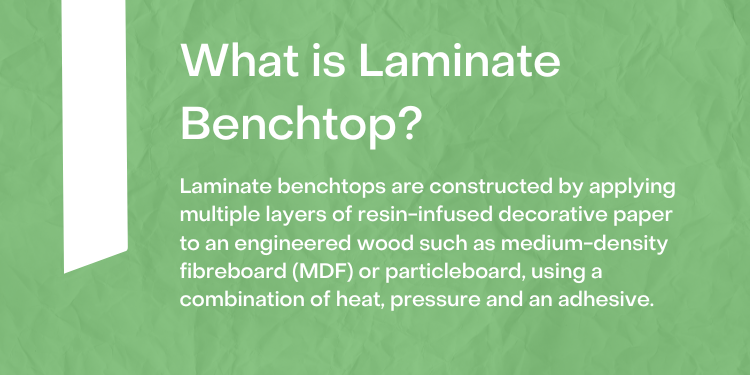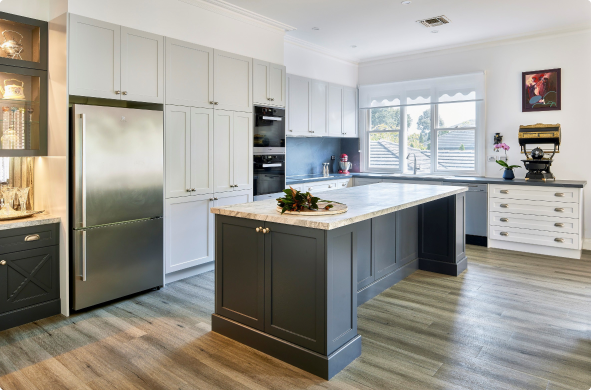What is Laminate Benchtop?
You’ll be spoilt for choice when it comes to choosing the right benchtops for your new kitchen, laundry or bathroom. Depending on your budget and personal preferences, laminate benchtops are one option you might want to consider—but what is laminate benchtop and how well does it perform?
Read on to find out more about laminate benchtop including some of the benefits and downsides of this notable benchtop material.
Key Summary
Laminate benchtop is an affordable benchtop material made by compressing layers of decorative paper and reinforced plastic on a substrate material such as MDF.

What is Laminate Benchtop?
Laminate benchtops are constructed by applying multiple layers of resin-infused decorative paper to an engineered wood such as medium-density fibreboard (MDF) or particleboard, using a combination of heat, pressure and an adhesive.
Having been a popular choice for kitchens, laundries and bathrooms for several decades, laminate benchtops are revered for delivering excellent value for money and providing customers with an extensive range of design options.
The Pros and Cons of Laminate Benchtops
Like most building products, laminate benchtop comes with various advantages and downsides which you need to be aware of when deciding if it could be the right option for your needs.
Pros
- Affordability: Price is possibly the most significant benefit of opting for a laminate benchtop. Laminate benchtops are significantly more affordable than most other benchtop materials, making it a highly attractive option if you’re renovating on a tight budget.
- Design options: Laminate benchtop is available in an extensive range of style, colour and finish options. Laminate benchtops have come a long way, with today’s decorative laminates doing a fairly good job of emulating the look of a variety of natural materials such as timber/wood grain, marble and granite. Some manufacturers can even produce custom designs for those who want to create a truly unique or personalised feature.
- Easy to install: Laminate benchtops can be cut to any size and are lighter in weight compared to most alternative benchtop materials, making for an easier installation process.
- Cleaning and hygiene: Laminate benchtops are very easy to keep clean by simply wiping them down after use with a soft cloth and mild cleaning solution. Many suppliers now also offer non-porous laminate benchtops with in-built antimicrobial technology to provide protection against bacteria, fungus and mould.
Cons
- Poor heat resistance: A major disadvantage of laminate benchtops is that they won’t perform well when exposed to high heat. Placing a hot pot or pan directly on the benchtop surface could cause it to burn, brown or blister.
- Susceptible to scratches and dents: Laminate benchtops are generally quite durable, however, they can be susceptible to scratches and dents. While textured laminate finishes are less likely to scratch compared to gloss/satin finishes, you should never cut or prepare food directly on the benchtop.
- Not viewed as luxurious: While laminate benchtops have come a long way in terms of style and durability, they are still considered an inferior product to most other benchtop materials. While this may not be an issue for you, it may make your property less appealing to buyers should you ever decide to sell the home.
How Durable Are Laminate Benchtops?
Kitchen benchtops are put to the test every day, continually being exposed to heat, water and various food products, so durability should always be a key consideration.
Laminate benchtops are generally quite durable for their level of affordability. While they won’t offer the same level of durability as stone and other materials, they tend to perform well in proximate to their cost. They can usually tolerate messes and spills well provided they aren’t left for extended periods.
Laminate benchtop manufacturers generally include a 7-year warranty with their products, however, you can usually expect to get around 10 years out of your laminate benchtop. When compared to the warranty that’s provided with most stone or engineered stone benchtops (which typically ranges from 10 years up to a lifetime warranty), this is significantly less.
Are Laminate Benchtops Water-Resistant?
Laminate benchtops are water-resistant, however, they can be susceptible to water damage if the benchtop surface is cracked or chipped.
While laminate benchtops are typically constructed using a moisture-resistant substrate material, if water seeps into cracks in the laminate surface it can cause the inner material to swell and delaminate.
What Thickness and Edge Profile Options Can You Choose From?
Laminate benchtops are generally produced with either a 38mm, 33mm or 20mm thickness, however, they can be customised to any thickness.
Laminate benchtops are typically made with a rounded edge profile (with various radius options available) as the laminate can be post-formed, meaning it is wrapped around the entire edge of the benchtop to provide greater protection against water damage and peeling.
While laminate benchtops can be produced with the square edges that tend to be the more popular design preference, opting for a square profile will result in a visible joint where the top and edge laminates meet and could be prone to peeling over time.
Laminate Benchtops Vs Stone Benchtops: Which is Better?
Stone tends to be the more popular choice because of its more luxurious and hard-wearing properties, however, it largely comes down to your budget and personal preferences.
While many homeowners may be able to justify splurging on stone in the kitchen, they may not be able to justify that same level of expense for a laundry or second bathroom. If you have the budget, you generally won’t regret opting for natural or engineered stone. However, if affordability is paramount, laminate could be a suitable alternative that offers good value for money.
Need Help Selecting the Perfect Benchtops?
Get in touch with the team at Mint Kitchens.
With access to an extensive range of premium quality products and the know-how to create spaces that are truly exceptional, we can guide you through your material selections to help you find a design that will tick every box.
Find out more about Mint kitchen renovations
<< back to our kitchen renovation glossary







